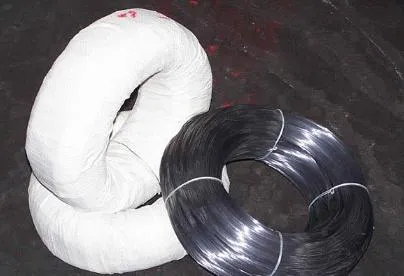 TEL:
+86-13102802206
TEL:
+86-13102802206
 E-mail:
fencenetting@china.com
E-mail:
fencenetting@china.com
 Linguagem
Linguagem
 TEL:
+86-13102802206
TEL:
+86-13102802206
 E-mail:
fencenetting@china.com
E-mail:
fencenetting@china.com
 Linguagem
Linguagem


Industrial binding, packaging, and construction projects demand not just strength, but dependable performance in any environment. Whether you’re operating in sub-zero temperatures or extreme heat, black iron wire stands out as a durable and flexible choice trusted by professionals worldwide. Its adaptability, affordability, and mechanical reliability make it the go-to wire solution across multiple industries.

One of the standout characteristics of black iron wire is its resilience under intense temperature changes. In freezing conditions, where many metals become brittle, soft black iron wire retains its ductility and binding strength. Conversely, in high-heat environments like industrial ovens, kilns, or furnace-bound packaging systems, black iron wire maintains structural integrity longer than many alternatives.
What makes this possible is the composition of the wire. Produced from low-carbon steel and often subjected to annealing, the wire develops a microstructure that enhances both toughness and elasticity. Even when exposed to extreme thermal expansion and contraction cycles, black iron wire maintains its original function without snapping or warping—qualities that are essential for critical tying and securing tasks.
This high-temperature tolerance is particularly beneficial for industries like metallurgy, ceramic production, and heavy-duty construction where wires are often exposed to thermal stress. Compared to other binding materials, black iron wire delivers more consistent performance across fluctuating environmental conditions.
While wire material defines its basic properties, the gauge—or thickness—determines its field of application. The flexibility, tensile strength, and binding capacity of black iron wire are heavily influenced by its diameter. Thicker gauges provide greater strength and are commonly used for tying rebar, bundling timber, or holding construction scaffolding in place.
On the other hand, thinner soft black iron wire gauges offer increased flexibility, making them ideal for manual use in gardening, floral arrangements, and packaging. The ductility of thinner wire allows for tight, secure knots and twists without excessive force, making it a favorite in settings where both strength and maneuverability are key.
Manufacturers offer customized wire gauges depending on application requirements, and this tailored production means that clients can balance load strength with handling ease. Notably, as wire thickness increases, so does the tensile load it can carry—but it may also require automated equipment for application. In such cases, the right balance of gauge and flexibility becomes a strategic consideration, especially when cost efficiency and labor ease are essential.
A common question arises in procurement and industrial planning: how does black iron wire compare to annealed iron wire, and which one should be used?
The difference lies in the treatment and resulting mechanical behavior. Black iron wire is often uncoated and untreated or slightly annealed, which gives it a tough exterior suitable for heavy-duty applications. It offers medium flexibility but excels in strength and holding capability.
In contrast, annealed iron wire undergoes a thorough thermal process to enhance softness and ductility. It bends more easily and is ideal for applications where hand tying or fine-tuned wrapping is required—like in packaging fragile materials or looping through smaller components.
Soft black iron wire, which falls somewhere in between, provides a balanced solution. It maintains adequate strength while offering enhanced pliability, making it a preferred choice in fast-paced work environments. The choice between the two wires ultimately comes down to job complexity, equipment compatibility, and user handling preferences.
When evaluating wire options for industrial use, affordability is just as important as performance. The black iron wire price has remained consistently competitive, offering a high-value option for contractors, packaging companies, agricultural producers, and construction firms.
Because black iron wire is easy to manufacture in bulk and doesn’t require complex surface treatments, it boasts a lower production cost compared to galvanized or stainless alternatives. However, this lower price doesn’t mean compromised performance. It still offers excellent tensile strength, corrosion tolerance for short-term exposure, and versatile usage across various environments.
The black iron wire price advantage is most apparent in large-scale projects, where thousands of wire ties are required. The cost savings become significant over time, especially when using customized gauges or soft black iron wire for ease of application. Moreover, the wire’s recyclability adds to its economic and environmental value, making it a smart choice for modern industries committed to efficiency and sustainability.
Black iron wire retains its strength in cold conditions and resists warping or snapping in high temperatures. Its structural integrity makes it ideal for environments with extreme temperature fluctuations.
Thicker black iron wire provides increased strength for heavy-duty applications, while thinner wire—especially soft black iron wire—is more flexible and suited for tasks that require manual tying or detailed work.
Black iron wire is typically stronger and less flexible, making it suitable for construction and binding. Annealed iron wire is softer and more pliable, perfect for packaging or tasks that require intricate shaping.
Soft black iron wire offers enough strength for securing materials while remaining pliable enough for fast manual use, making it ideal for high-speed work environments and diverse application settings.
The black iron wire price is generally lower than galvanized or stainless options, providing an affordable solution for high-volume industrial use without compromising on core performance.